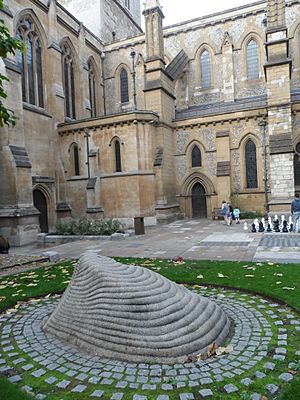Mahomet Weyonomon facts for kids
Quick facts for kids
Mahomet Weyonomon
|
|
|---|---|

Mahomet Weyonomon's memorial stone, London
|
|
| Born | c. 1700 Mohegan territory, Connecticut Colony
|
| Died | 11 August 1736 (age about 36) |
| Cause of death | smallpox |
| Resting place | outside Southwark Cathedral |
| Nationality | Mohegan |
| Title | Sachem |
Mahomet Weyonomon (born around 1700 – died 11 August 1736) was a Native American tribal leader. He was a sachem (chief) of the Mohegan tribe from Connecticut. In 1735, he traveled all the way to England to ask King George II for better treatment for his people.
Contents
Early Life and Leadership
Mahomet Weyonomon was the great-grandson of Uncas. Uncas was a very important sachem of the Mohegan tribe. In 1735, Mahomet was chosen to become the new sachem. This happened with the help of Captain John Mason. Mason was a descendant of an early settler who had promised to protect Mohegan land.
Protecting Mohegan Lands
By 1735, the Mohegan people had lost much of their land. White settlers in New England were taking their planting and hunting areas. Mahomet Weyonomon wanted to stop this and protect his tribe's future. He believed the King of England could help.
Journey to England
Mahomet decided to travel to England to speak directly to the King. He went with two settlers, John and Samuel Mason, who supported his cause. Another Mohegan man, AughQuant, also joined them on this important journey.
Preparing the Petition
Once in London, the group rented a place to stay. They worked hard to prepare their official request, called a petition, for the King. They hoped the King would listen to their concerns about the land.
An Unfinished Mission
King George II received their petition. He then sent the matter to a special group called the Lords Commissioners. This group was in charge of foreign trade and colonies. Sadly, both Mahomet Weyonomon and John Mason became very sick. They caught smallpox, a dangerous disease at the time. They both died in 1736 before their case could be heard by the commission.
A Lasting Memorial
Because Mahomet was a foreigner, he could not be buried inside the City of London. He was buried in an unmarked grave outside a church, which is now known as Southwark Cathedral. For many years, his grave had no marker.
Honoring a Mohegan Leader
On 22 November 2006, Queen Elizabeth II honored Mahomet Weyonomon. She dedicated a special memorial stone at the cathedral. It was a sculpture created by British artist Peter Randall-Page. Members of the Mohegan tribe also held a traditional funeral ceremony for him.
 | George Robert Carruthers |
 | Patricia Bath |
 | Jan Ernst Matzeliger |
 | Alexander Miles |

